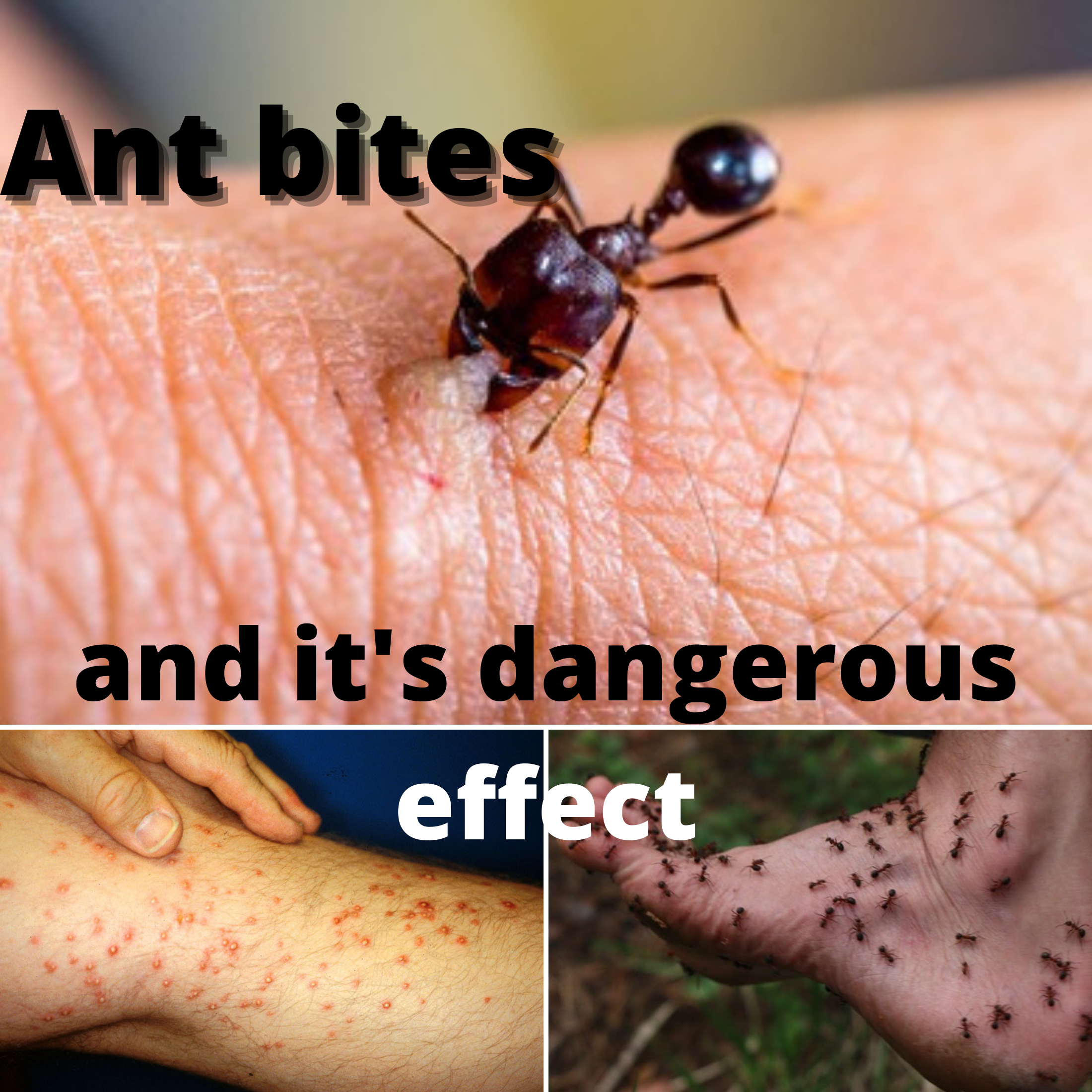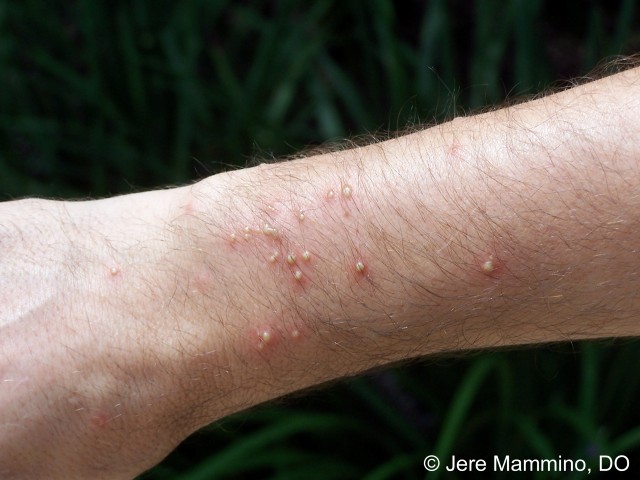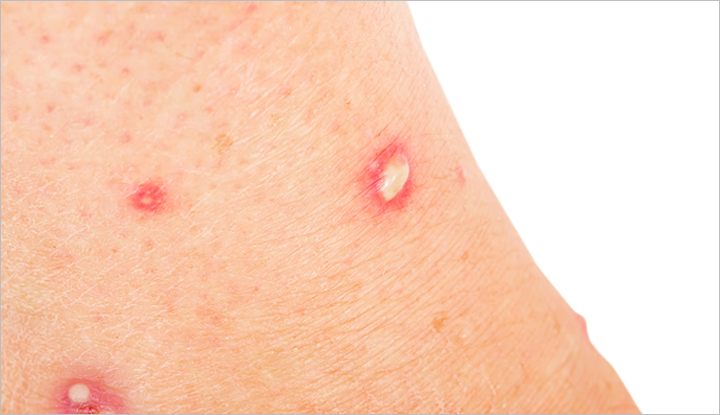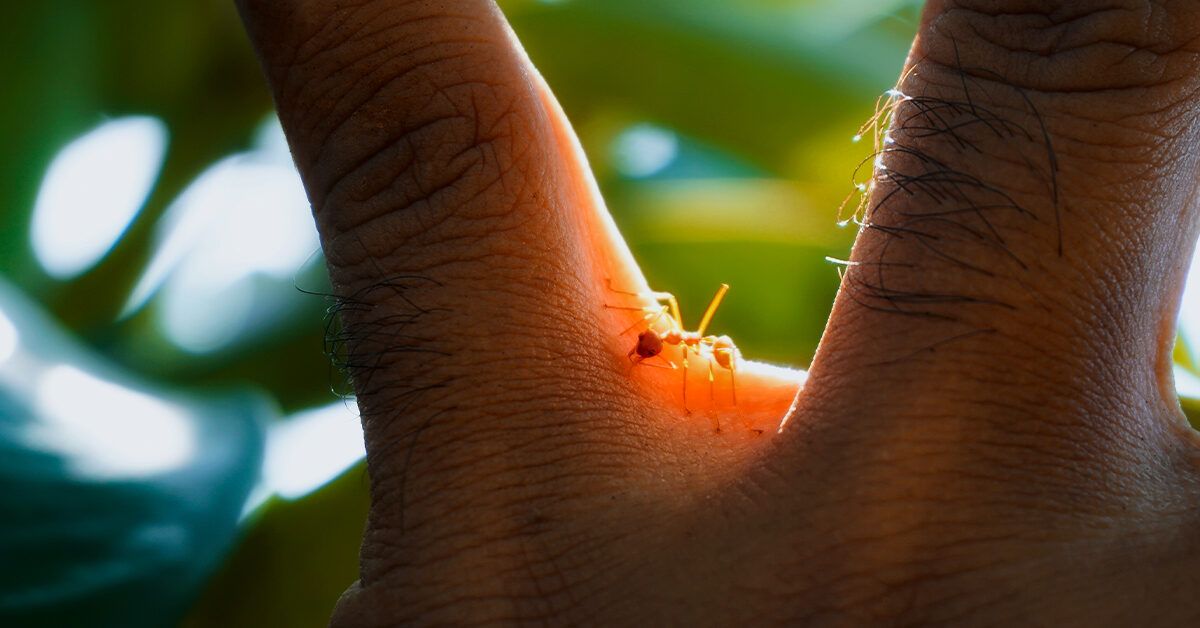Ant bites blister due to an allergic reaction to the ant’s venom. The body’s immune response to the venom can manifest as blisters.
Ants, small as they are, wield a powerful defense mechanism. When they bite or sting, they inject venom that can cause various reactions in humans. While not all ant bites result in blisters, species like fire ants are notorious for their painful and blistering bites.
A single ant attack might involve multiple stings, leading to clusters of small, pus-filled blisters that can be both itchy and painful. These blisters are a part of the body’s natural defense, aiming to isolate and combat the venom. The severity of the reaction can vary depending on the individual’s sensitivity to insect stings and the type of ant involved. Proper care and sometimes, medical attention are essential to manage the symptoms and prevent infection.
The Ant Bite: A Painful Introduction
Imagine walking outside on a sunny day and feeling a sharp sting on your skin. You’ve just met an ant, and not in a friendly way. Ant bites can lead to blisters, a painful reminder of this tiny insect’s defense mechanism. Let’s discover why these small creatures pack such a powerful punch.
Initial Ant Encounter
Ants are everywhere. While exploring their world, they often stumble upon human skin. Curious or threatened, they use their mandibles to investigate or defend. This first contact is innocuous, almost unnoticed. But it can quickly escalate.
The Immediate Bite Response
When an ant bites, it injects venom. This venom is why ant bites blister. The skin reacts, fighting this tiny invasion. Here’s what happens:
- Penetration: Sharp mandibles break skin.
- Injection: Ants release formic acid or venom.
- Defense: The body’s immune response kicks in.
Inflamed skin, redness, and eventually a blister form. This blister is the body’s shield, a bubble cushioning the damaged area while it heals. Understanding the cause of the blister is essential for proper treatment and relief.
| Phase | Reaction | Symptom |
|---|---|---|
| Initial Bite | Ant’s Defense | Sting, Sharp Pain |
| Body’s Response | Immune Defense | Swelling, Redness |
| Healing | Tissue Repair | Blister Formation |
By knowing what to expect, you’re better prepared to treat ant bites. Simple measures like cleaning the area and using topical creams usually suffice. In severe cases, seek medical attention. Remember, these tiny warriors mean business!

Credit: paidepo.com
Venom And Virulence: Ant’s Defense Mechanism
Ants may look small, but they pack a powerful punch. Their venom is a defense mechanism that keeps predators at bay and maintains their colony’s safety.
Composition Of Ant Venom
Ant venom is a chemical cocktail. It contains proteins, peptides, and alkaloids. Different ant species have different venom makeups.
| Ant Species | Venom Components |
|---|---|
| Fire Ants | Solenopsin |
| Bullet Ants | Poneratoxin |
| Carpenter Ants | Formic Acid |
Some components are irritants, causing redness and swelling. Others can break down cell membranes or disrupt nervous system functionality.
Purpose Of The Sting
The sting delivers venom. It’s not just for defense. The sting helps in hunting and protecting resources. Let’s see how:
- Wards off enemies: Deters larger attackers from harming the colony.
- Immobilizes prey: Allows ants to hunt and bring food back to the nest.
- Communication: Sends chemical signals to other ants about danger.
Ant stings can result in blisters due to their venom’s potency. The body reacts to the venom, resulting in the blisters often seen after ant bites.
Anatomy Of An Ant Bite
Ever wonder why ant bites often blister? The answer lies in the anatomy of an ant bite. When an ant feels threatened, it defends itself using its mouthparts. Though tiny, their bite has powerful effects on human skin.
Mechanics Of The Bite
Ants use their mandibles, or jaws, to bite. These mandibles are not only for eating but also for gripping enemies.
- Ant jaws open and close sideways.
- They’re strong and can break skin.
- Some ants latch on and twist their bodies as they bite.
Ant’s Injectable Toxins
Apart from the physical bite, ants inject toxins. These toxins cause the sting and blisters. Each ant species has different toxins.
Fire ants, for example, inject solanine, which triggers a burning sensation.
| Ant Type | Toxin | Effect |
|---|---|---|
| Fire Ant | Solenopsin | Itching, Burning |
| Harvester Ant | Piperidine | Sharp Pain, Swelling |
| Bullet Ant | Poneratoxin | Intense Pain |
The body’s reaction to these toxins is swelling, redness, and blisters.
From Sting To Blister: The Human Skin Reaction
Imagine walking barefoot through the grass when suddenly, ouch! An ant bites you. Within hours, a small, itchy, and sometimes painful blister forms. This is your body’s response to ant venom. But why does this happen, and what takes place beneath our skin’s surface to create that blister? Let’s dive into the fascinating process your skin undergoes from that initial sting to blister formation.
Immune Response To Ant Venom
When an ant bites, it injects venom into your skin. This venom is full of proteins that can be foreign to your body. The immune system springs into action to fight off these invaders. Mast cells release histamine, which causes redness, swelling, and itchiness. Your body’s reaction might be mild or intense, depending on how sensitive you are to the venom.
Process Of Blister Formation
The blister’s journey starts right at the sting. Histamine increases blood flow and white blood cell movement to the affected area. This leads to inflammation and fluid accumulation. The top layer of skin lifts, creating a bubble-like structure—a blister. It’s a protective shield, giving the underlying skin a chance to heal. Look out for these signs:
- Redness: The stung area turns red as blood rushes there.
- Swelling: Fluid piles up under the skin, causing a bump.
- Pus: It may or may not be present, depending on infection.
So, a blister from an ant bite isn’t just a nuisance. It’s a sign that your body is doing its job to protect you from invaders. Remember, it’s essential to keep the blister clean and avoid popping it to prevent infection.
Varieties Of Ant Bites And Their Effects
Ant bites are a common ailment, but their impact varies widely. From mild irritation to severe allergic reactions, the consequences differ. Stinging ants inject venom that can cause pain and discomfort. Blisters are one of the more serious outcomes of an ant bite. Let’s explore which ants are the usual suspects for these painful blisters.
Fire Ants: A Common CulpritFire Ants: A Common Culprit
Fire ants are notorious for their painful bites. They latch onto the skin, sting, and inject solenopsin, a toxic alkaloid venom. This venom causes a burning sensation and can lead to pustule formation. Here’s what to watch out for with fire ant bites:
- Immediate sharp pain
- Redness and swelling
- Development of itchy blisters
The blister often appears as a white pustule a day after the bite.
Seek medical attention if the pain persists or allergic reactions occur.
Harvester Ants: Another Blistering BiteHarvester Ants: Another Blistering Bite
Harvester ants deliver another painful sting. While less common, their bites should not be taken lightly.
Harvester ant venom contains compounds that can blister the skin. Following a sting, one might notice:
- A sharp, burning pain
- Red, swollen area around the bite
- Formation of clear or bloody blisters
In some cases, harvester ant bites can require medical intervention. Always clean the area and monitor for signs of infection.
Treatment: Alleviating The Irritation
Ant bites can be a real nuisance, causing blisters and severe irritation. Knowing how to treat these bites quickly and effectively is key. This section will guide you through immediate remedies and when to seek professional medical help.
Immediate Remedies for Ant BitesImmediate Remedies For Ant Bites
Immediate action can minimize pain and swelling caused by ant bites. Follow these steps:
- Clean the bite with soap and water.
- Apply a cold compress to reduce swelling.
- Use an antihistamine cream to ease itching.
- Avoid scratching to prevent infection.
Professional Medical Intervention
Oftentimes, simple home remedies are enough. Yet, some situations warrant professional medical intervention.
| Sign | Action |
|---|---|
| Large areas of swelling | Seek doctor’s advice |
| Signs of infection | Go to a clinic immediately |
| Allergic reactions | Contact emergency services |
Preventive Measures: Avoiding Ant Bites
Ant bites can lead to painful blisters, and taking preventive measures is key to avoid them. Learning about effective repellents and safe practices can help minimize the risk of ant bites. It’s important to know how to stay safe around these tiny insects.
Effective Ant Repellents
Keeping ants away involves using repellents that they dislike. Here are the top repellents:
- Vinegar Solution: Mix equal parts of water and vinegar and spray around entry points.
- Citrus Peels:Place them in areas where ants are found to keep them at bay.
- Essential Oils: Peppermint, tea tree, and lemon oils deter ants when wiped on surfaces.
- Diatomaceous Earth: Sprinkle this natural powder where ant trails are observed.
Safe Practices In Ant Territories
Staying safe in areas with high ant activity is crucial. Follow these practices:
- Wear Protective Clothing: Long sleeves and pants protect the skin from bites.
- Seal Food Containers: Airtight containers prevent ants from being attracted to food.
- Avoid Scented Products: Fragranced lotions and perfumes may attract ants.
- Keep Areas Clean: Remove leftover food and spills to not invite ants in.

Credit: www.aocd.org
When Ants Attack: Understanding Aggression
Picture a sunny day in your backyard, a perfect scene until suddenly, you feel a sharp sting. Ant bites are common, especially if you invade their space. Ever wonder why some ant bites blister or become unusually painful? It’s all about understanding when and why ants become aggressive.
Ant Behavior And Aggression Triggers
Ants are fascinating insects with complex behaviors. They live in colonies and work together. Each ant has a role, but they all focus on the colony’s survival. What triggers their aggression? Here are some key points:
- Protection: Ants will attack if they sense a threat.
- Food: They protect their food sources fiercely.
- Pheromones: These chemical signals can spark an aggressive response.
Nest Defense And Human Interaction
Your presence can be a big problem for ants. They see you as a giant invader. When they encounter humans, it’s often a story of defense and survival. A few reasons you might get bitten:
| Reason | Ant Reaction |
|---|---|
| Close to nest | Bite as a warning |
| Direct threat | Attack to defend |
| Accidental contact | Use venom out of fear |
Ant bites may result in blisters as the ant injects venom. This venom causes irritation and helps the ant defend its home from what it perceives as danger. Understanding these tiny creatures’ behaviors can help minimize unpleasant encounters. Stay observant and respect their space to avoid those painful nips on your skin.
Long-term Effects: When To Be Concerned
Ant bites can seem small, but in some cases, they cause more than just a brief sting. In rare situations, these little wounds may have long-term effects that call for extra attention. Knowing when to be concerned about an ant bite is crucial for your well-being.
Signs Of Complicated Reactions
A few signs suggest an ant bite is more than it seems. Look for these symptoms:
- Persistent redness at the bite site well after the initial bite
- Blistering that spreads or worsens over time
- An increase in pain or swelling days after the bite
- Symptoms of an allergic reaction, such as hives or difficulty breathing
Seeking Help For Severe Cases
It’s important to seek medical help if you experience:
- Signs of infection such as pus or increasing redness
- Fever following an ant bite
- Large areas of swelling or redness around the bite
- Difficulty breathing or feeling faint, which could indicate a severe allergic reaction
If you notice these, contact a health professional right away.
The Role Of Allergies In Ant Bite Reactions
Ant bites can cause blisters, particularly in sensitive individuals. The culprit? Allergies. People react differently to ant venoms due to allergic responses. Allergies can amplify the swelling, redness, and blistering from a bite.
Identifying Allergic Reactions To Bites
Distinguishing an allergic reaction is crucial for proper care and treatment. Signs to watch for include:
- Large, expanding redness around the bite
- Intense itchiness or pain
- Development of a blister or a raised welt
- Breathing difficulties in severe cases
Seek immediate medical attention if you experience breathing issues, dizziness, or swelling of the face or mouth.
Managing Allergies And Future Bites
Being proactive can minimize allergic reactions to ant bites. Strategies include:
- Avoidance of ant-infested areas
- Using protective clothing
- Application of insect repellent
In case of a bite:
- Wash the affected area with soap and water
- Apply a cold compress to reduce swelling and itching
- Consider antihistamines to control allergic symptoms
For persistent or severe reactions, consulting an allergist is advised. An allergist can recommend long-term treatments such as immunotherapy.

Credit: my.clevelandclinic.org
Frequently Asked Questions On Why Do Ant Bites Blister
What Causes Ant Bites To Blister?
Ant bites often blister due to an allergic reaction to the ant venom. This reaction causes the release of histamine, leading to inflammation and blistering as the body tries to fight off the perceived threat.
How To Treat Blisters From Ant Bites?
Clean the area with soap and water first. Apply a cold compress to reduce swelling. If the blister is painful, over-the-counter hydrocortisone cream may alleviate symptoms. Avoid popping blisters to reduce the risk of infection.
Can Ant Bites Lead To Serious Complications?
Usually, ant bites cause minor reactions. But in some individuals, particularly those allergic to insect stings, ant bites can trigger severe allergic reactions that require immediate medical attention, such as anaphylaxis.
What Are The Symptoms Of An Allergic Reaction To Ant Bites?
Symptoms include redness, swelling, pain, and blisters at the bite site. In severe cases, symptoms can escalate to difficulty breathing, dizziness, and swelling of the throat or tongue, signaling anaphylaxis which requires urgent care.
Conclusion
Ant bites can lead to blisters as a natural defense mechanism. Understanding their cause can help in avoiding and treating these painful reactions. Remember, swift and proper care is crucial. Continue to stay informed and protect your skin with the right measures.
Your comfort and health are paramount.

I’m MD Tanvir, and I bring years of expertise gained from working closely with pest control companies to the forefront. My journey in the industry has inspired me to launch Bug Battler, a platform aimed at equipping people with the know-how to combat pests autonomously. Through Bug Battler, I aim to empower individuals with practical insights to tackle pest infestations effectively.

